Analysis of OPEC and the Global Oil Market Over the Last Decade
VerifiedAdded on 2020/04/21
|6
|1308
|80
Essay
AI Summary
This essay provides a comprehensive analysis of the Organization of the Petroleum Exporting Countries (OPEC) and its influence on the global oil market. It begins with a historical overview of OPEC, established in 1960, and examines the dynamics the organization has faced over the last decade. The essay focuses on Saudi Arabia, a key OPEC member, and its economy, analyzing the effects of global oil crises and price fluctuations. It explores factors such as demand and supply changes, geopolitical events, and the rise of alternative fuels. The analysis includes Indonesia's withdrawal and rejoining, the Paris Climate Agreement, and the impact of US oil production. The essay concludes by considering potential strategies for Saudi Arabia's economic recovery, including fiscal transparency and diversification efforts, while acknowledging the challenges OPEC faces in controlling oil production in the current market environment.
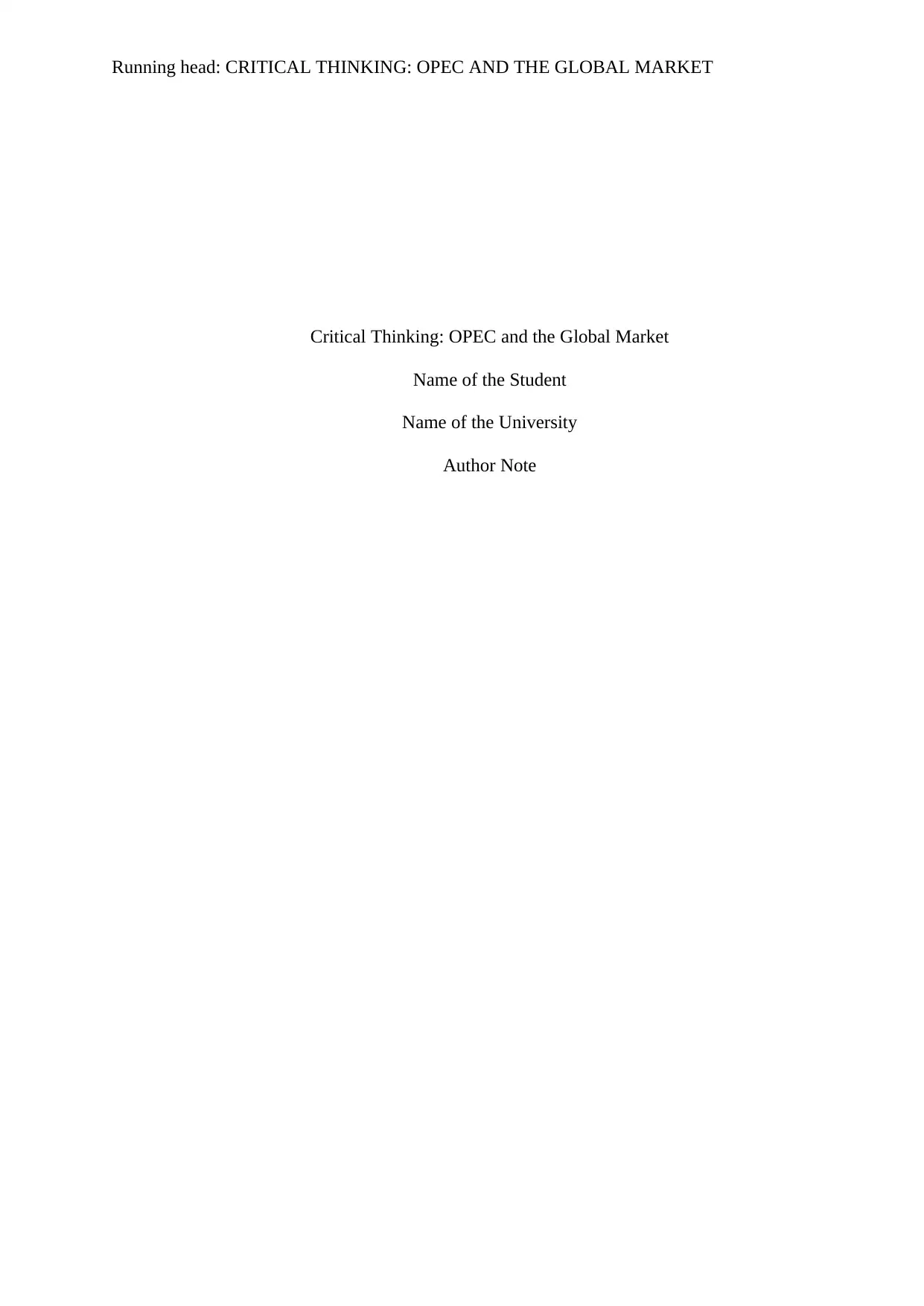
Running head: CRITICAL THINKING: OPEC AND THE GLOBAL MARKET
Critical Thinking: OPEC and the Global Market
Name of the Student
Name of the University
Author Note
Critical Thinking: OPEC and the Global Market
Name of the Student
Name of the University
Author Note
Paraphrase This Document
Need a fresh take? Get an instant paraphrase of this document with our AI Paraphraser
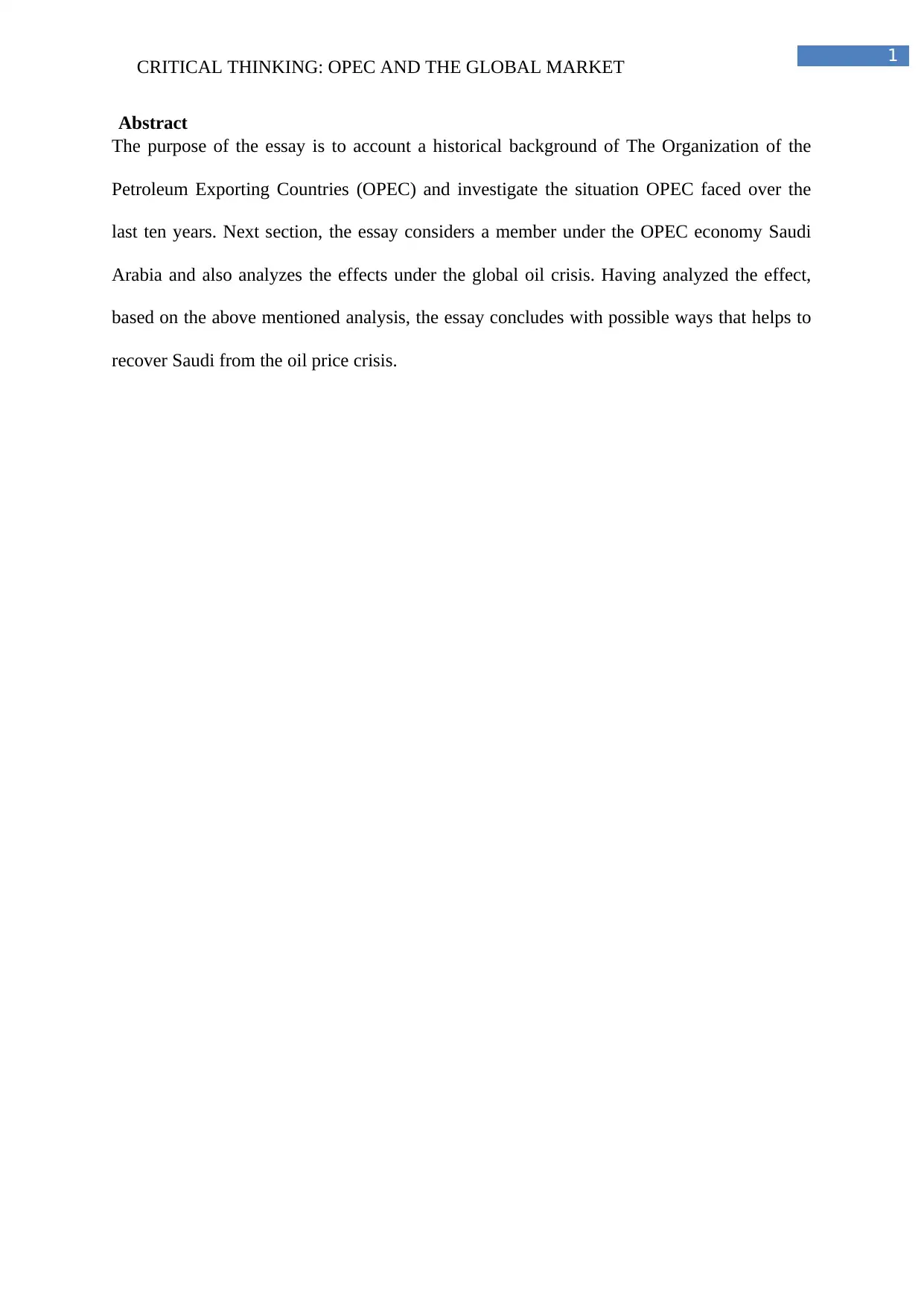
1
CRITICAL THINKING: OPEC AND THE GLOBAL MARKET
Abstract
The purpose of the essay is to account a historical background of The Organization of the
Petroleum Exporting Countries (OPEC) and investigate the situation OPEC faced over the
last ten years. Next section, the essay considers a member under the OPEC economy Saudi
Arabia and also analyzes the effects under the global oil crisis. Having analyzed the effect,
based on the above mentioned analysis, the essay concludes with possible ways that helps to
recover Saudi from the oil price crisis.
CRITICAL THINKING: OPEC AND THE GLOBAL MARKET
Abstract
The purpose of the essay is to account a historical background of The Organization of the
Petroleum Exporting Countries (OPEC) and investigate the situation OPEC faced over the
last ten years. Next section, the essay considers a member under the OPEC economy Saudi
Arabia and also analyzes the effects under the global oil crisis. Having analyzed the effect,
based on the above mentioned analysis, the essay concludes with possible ways that helps to
recover Saudi from the oil price crisis.
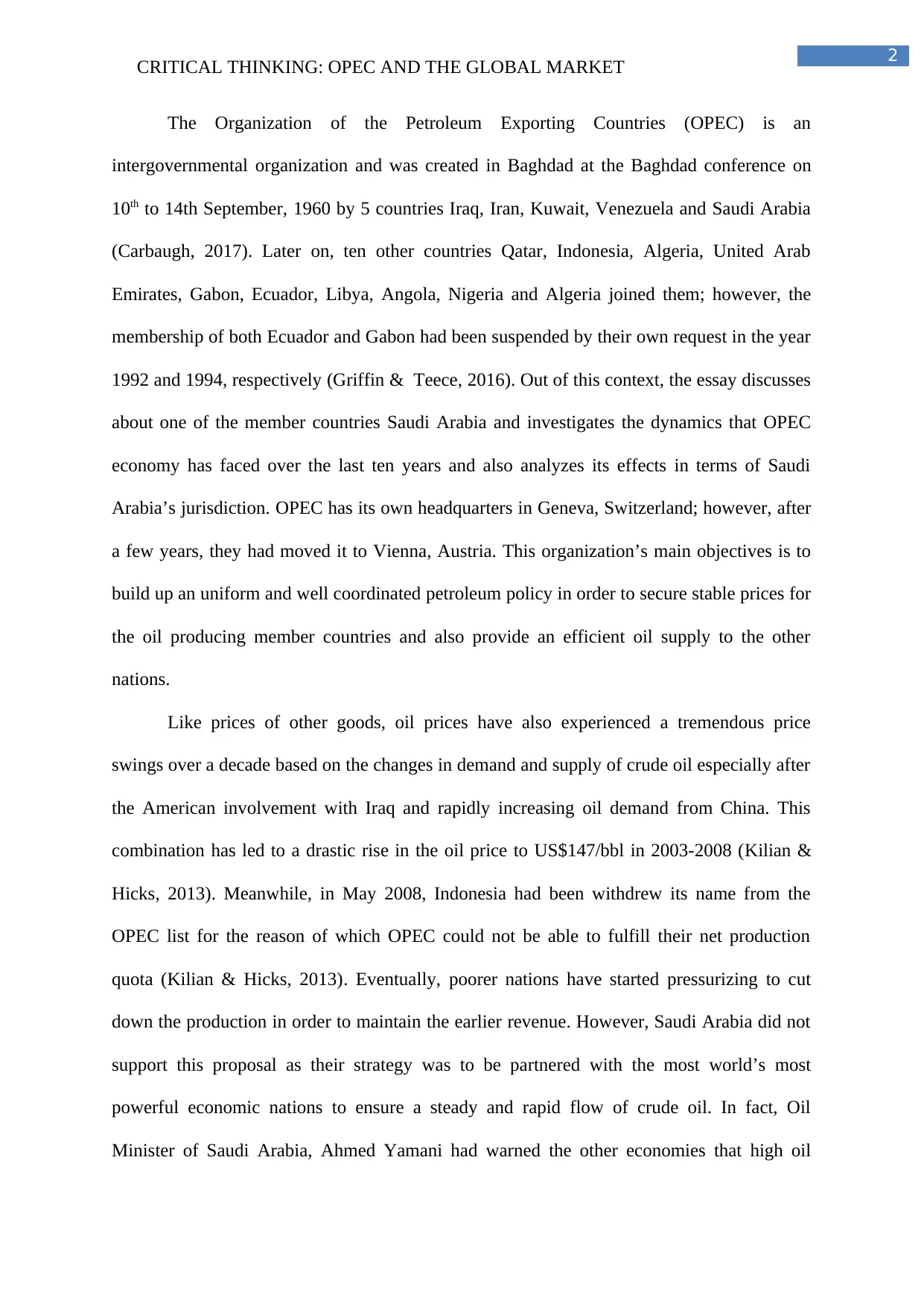
2
CRITICAL THINKING: OPEC AND THE GLOBAL MARKET
The Organization of the Petroleum Exporting Countries (OPEC) is an
intergovernmental organization and was created in Baghdad at the Baghdad conference on
10th to 14th September, 1960 by 5 countries Iraq, Iran, Kuwait, Venezuela and Saudi Arabia
(Carbaugh, 2017). Later on, ten other countries Qatar, Indonesia, Algeria, United Arab
Emirates, Gabon, Ecuador, Libya, Angola, Nigeria and Algeria joined them; however, the
membership of both Ecuador and Gabon had been suspended by their own request in the year
1992 and 1994, respectively (Griffin & Teece, 2016). Out of this context, the essay discusses
about one of the member countries Saudi Arabia and investigates the dynamics that OPEC
economy has faced over the last ten years and also analyzes its effects in terms of Saudi
Arabia’s jurisdiction. OPEC has its own headquarters in Geneva, Switzerland; however, after
a few years, they had moved it to Vienna, Austria. This organization’s main objectives is to
build up an uniform and well coordinated petroleum policy in order to secure stable prices for
the oil producing member countries and also provide an efficient oil supply to the other
nations.
Like prices of other goods, oil prices have also experienced a tremendous price
swings over a decade based on the changes in demand and supply of crude oil especially after
the American involvement with Iraq and rapidly increasing oil demand from China. This
combination has led to a drastic rise in the oil price to US$147/bbl in 2003-2008 (Kilian &
Hicks, 2013). Meanwhile, in May 2008, Indonesia had been withdrew its name from the
OPEC list for the reason of which OPEC could not be able to fulfill their net production
quota (Kilian & Hicks, 2013). Eventually, poorer nations have started pressurizing to cut
down the production in order to maintain the earlier revenue. However, Saudi Arabia did not
support this proposal as their strategy was to be partnered with the most world’s most
powerful economic nations to ensure a steady and rapid flow of crude oil. In fact, Oil
Minister of Saudi Arabia, Ahmed Yamani had warned the other economies that high oil
CRITICAL THINKING: OPEC AND THE GLOBAL MARKET
The Organization of the Petroleum Exporting Countries (OPEC) is an
intergovernmental organization and was created in Baghdad at the Baghdad conference on
10th to 14th September, 1960 by 5 countries Iraq, Iran, Kuwait, Venezuela and Saudi Arabia
(Carbaugh, 2017). Later on, ten other countries Qatar, Indonesia, Algeria, United Arab
Emirates, Gabon, Ecuador, Libya, Angola, Nigeria and Algeria joined them; however, the
membership of both Ecuador and Gabon had been suspended by their own request in the year
1992 and 1994, respectively (Griffin & Teece, 2016). Out of this context, the essay discusses
about one of the member countries Saudi Arabia and investigates the dynamics that OPEC
economy has faced over the last ten years and also analyzes its effects in terms of Saudi
Arabia’s jurisdiction. OPEC has its own headquarters in Geneva, Switzerland; however, after
a few years, they had moved it to Vienna, Austria. This organization’s main objectives is to
build up an uniform and well coordinated petroleum policy in order to secure stable prices for
the oil producing member countries and also provide an efficient oil supply to the other
nations.
Like prices of other goods, oil prices have also experienced a tremendous price
swings over a decade based on the changes in demand and supply of crude oil especially after
the American involvement with Iraq and rapidly increasing oil demand from China. This
combination has led to a drastic rise in the oil price to US$147/bbl in 2003-2008 (Kilian &
Hicks, 2013). Meanwhile, in May 2008, Indonesia had been withdrew its name from the
OPEC list for the reason of which OPEC could not be able to fulfill their net production
quota (Kilian & Hicks, 2013). Eventually, poorer nations have started pressurizing to cut
down the production in order to maintain the earlier revenue. However, Saudi Arabia did not
support this proposal as their strategy was to be partnered with the most world’s most
powerful economic nations to ensure a steady and rapid flow of crude oil. In fact, Oil
Minister of Saudi Arabia, Ahmed Yamani had warned the other economies that high oil
⊘ This is a preview!⊘
Do you want full access?
Subscribe today to unlock all pages.

Trusted by 1+ million students worldwide
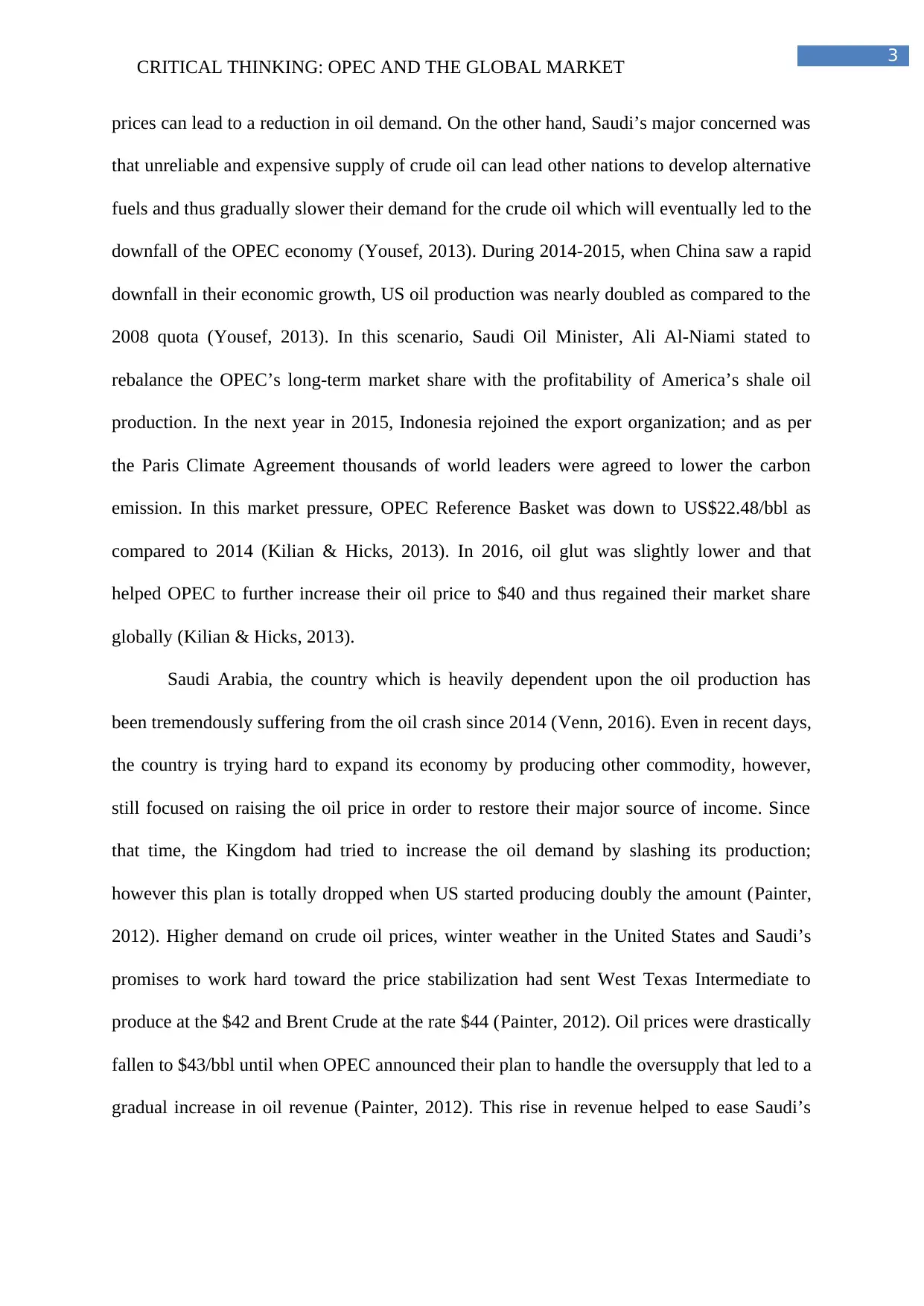
3
CRITICAL THINKING: OPEC AND THE GLOBAL MARKET
prices can lead to a reduction in oil demand. On the other hand, Saudi’s major concerned was
that unreliable and expensive supply of crude oil can lead other nations to develop alternative
fuels and thus gradually slower their demand for the crude oil which will eventually led to the
downfall of the OPEC economy (Yousef, 2013). During 2014-2015, when China saw a rapid
downfall in their economic growth, US oil production was nearly doubled as compared to the
2008 quota (Yousef, 2013). In this scenario, Saudi Oil Minister, Ali Al-Niami stated to
rebalance the OPEC’s long-term market share with the profitability of America’s shale oil
production. In the next year in 2015, Indonesia rejoined the export organization; and as per
the Paris Climate Agreement thousands of world leaders were agreed to lower the carbon
emission. In this market pressure, OPEC Reference Basket was down to US$22.48/bbl as
compared to 2014 (Kilian & Hicks, 2013). In 2016, oil glut was slightly lower and that
helped OPEC to further increase their oil price to $40 and thus regained their market share
globally (Kilian & Hicks, 2013).
Saudi Arabia, the country which is heavily dependent upon the oil production has
been tremendously suffering from the oil crash since 2014 (Venn, 2016). Even in recent days,
the country is trying hard to expand its economy by producing other commodity, however,
still focused on raising the oil price in order to restore their major source of income. Since
that time, the Kingdom had tried to increase the oil demand by slashing its production;
however this plan is totally dropped when US started producing doubly the amount (Painter,
2012). Higher demand on crude oil prices, winter weather in the United States and Saudi’s
promises to work hard toward the price stabilization had sent West Texas Intermediate to
produce at the $42 and Brent Crude at the rate $44 (Painter, 2012). Oil prices were drastically
fallen to $43/bbl until when OPEC announced their plan to handle the oversupply that led to a
gradual increase in oil revenue (Painter, 2012). This rise in revenue helped to ease Saudi’s
CRITICAL THINKING: OPEC AND THE GLOBAL MARKET
prices can lead to a reduction in oil demand. On the other hand, Saudi’s major concerned was
that unreliable and expensive supply of crude oil can lead other nations to develop alternative
fuels and thus gradually slower their demand for the crude oil which will eventually led to the
downfall of the OPEC economy (Yousef, 2013). During 2014-2015, when China saw a rapid
downfall in their economic growth, US oil production was nearly doubled as compared to the
2008 quota (Yousef, 2013). In this scenario, Saudi Oil Minister, Ali Al-Niami stated to
rebalance the OPEC’s long-term market share with the profitability of America’s shale oil
production. In the next year in 2015, Indonesia rejoined the export organization; and as per
the Paris Climate Agreement thousands of world leaders were agreed to lower the carbon
emission. In this market pressure, OPEC Reference Basket was down to US$22.48/bbl as
compared to 2014 (Kilian & Hicks, 2013). In 2016, oil glut was slightly lower and that
helped OPEC to further increase their oil price to $40 and thus regained their market share
globally (Kilian & Hicks, 2013).
Saudi Arabia, the country which is heavily dependent upon the oil production has
been tremendously suffering from the oil crash since 2014 (Venn, 2016). Even in recent days,
the country is trying hard to expand its economy by producing other commodity, however,
still focused on raising the oil price in order to restore their major source of income. Since
that time, the Kingdom had tried to increase the oil demand by slashing its production;
however this plan is totally dropped when US started producing doubly the amount (Painter,
2012). Higher demand on crude oil prices, winter weather in the United States and Saudi’s
promises to work hard toward the price stabilization had sent West Texas Intermediate to
produce at the $42 and Brent Crude at the rate $44 (Painter, 2012). Oil prices were drastically
fallen to $43/bbl until when OPEC announced their plan to handle the oversupply that led to a
gradual increase in oil revenue (Painter, 2012). This rise in revenue helped to ease Saudi’s
Paraphrase This Document
Need a fresh take? Get an instant paraphrase of this document with our AI Paraphraser
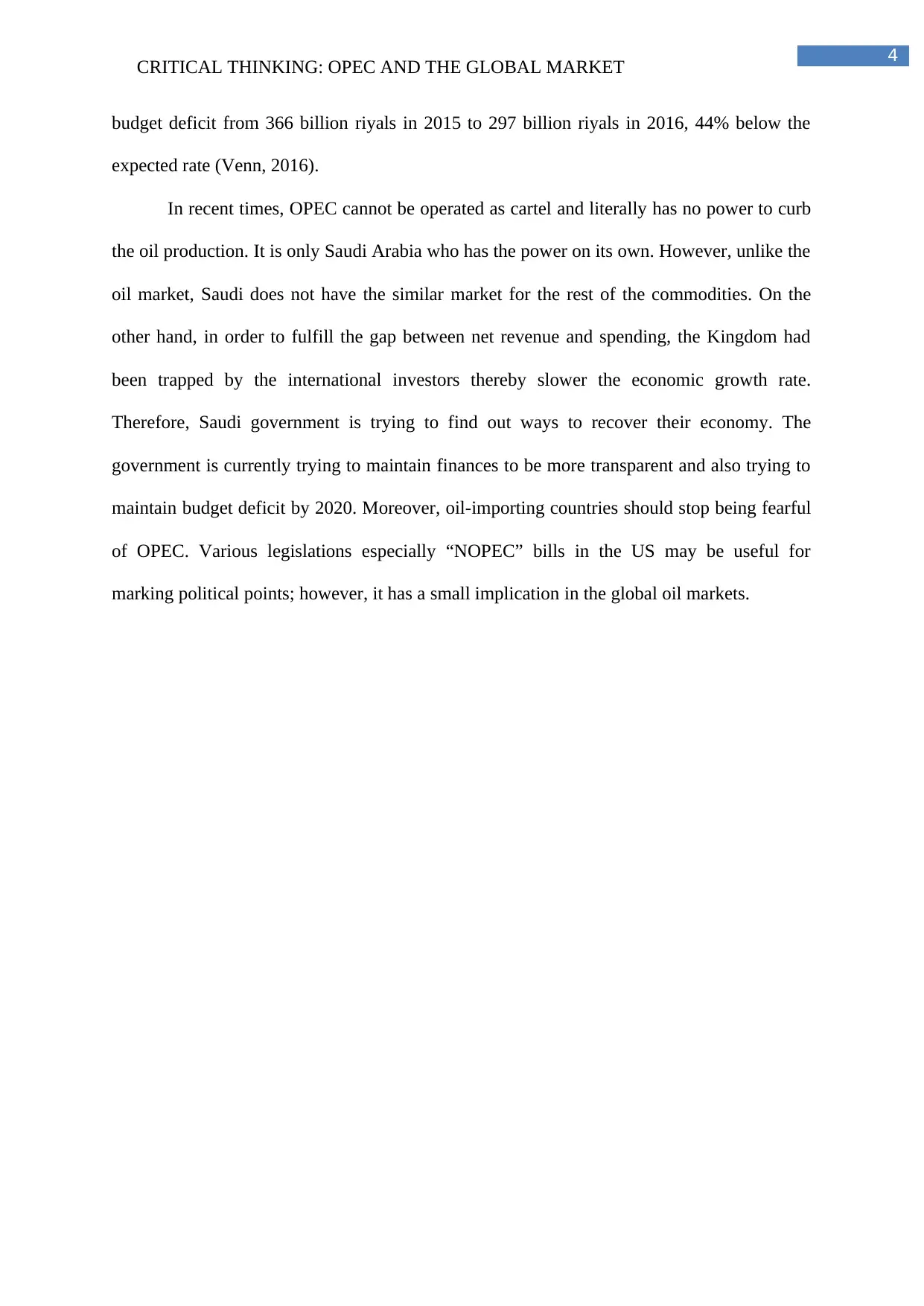
4
CRITICAL THINKING: OPEC AND THE GLOBAL MARKET
budget deficit from 366 billion riyals in 2015 to 297 billion riyals in 2016, 44% below the
expected rate (Venn, 2016).
In recent times, OPEC cannot be operated as cartel and literally has no power to curb
the oil production. It is only Saudi Arabia who has the power on its own. However, unlike the
oil market, Saudi does not have the similar market for the rest of the commodities. On the
other hand, in order to fulfill the gap between net revenue and spending, the Kingdom had
been trapped by the international investors thereby slower the economic growth rate.
Therefore, Saudi government is trying to find out ways to recover their economy. The
government is currently trying to maintain finances to be more transparent and also trying to
maintain budget deficit by 2020. Moreover, oil-importing countries should stop being fearful
of OPEC. Various legislations especially “NOPEC” bills in the US may be useful for
marking political points; however, it has a small implication in the global oil markets.
CRITICAL THINKING: OPEC AND THE GLOBAL MARKET
budget deficit from 366 billion riyals in 2015 to 297 billion riyals in 2016, 44% below the
expected rate (Venn, 2016).
In recent times, OPEC cannot be operated as cartel and literally has no power to curb
the oil production. It is only Saudi Arabia who has the power on its own. However, unlike the
oil market, Saudi does not have the similar market for the rest of the commodities. On the
other hand, in order to fulfill the gap between net revenue and spending, the Kingdom had
been trapped by the international investors thereby slower the economic growth rate.
Therefore, Saudi government is trying to find out ways to recover their economy. The
government is currently trying to maintain finances to be more transparent and also trying to
maintain budget deficit by 2020. Moreover, oil-importing countries should stop being fearful
of OPEC. Various legislations especially “NOPEC” bills in the US may be useful for
marking political points; however, it has a small implication in the global oil markets.
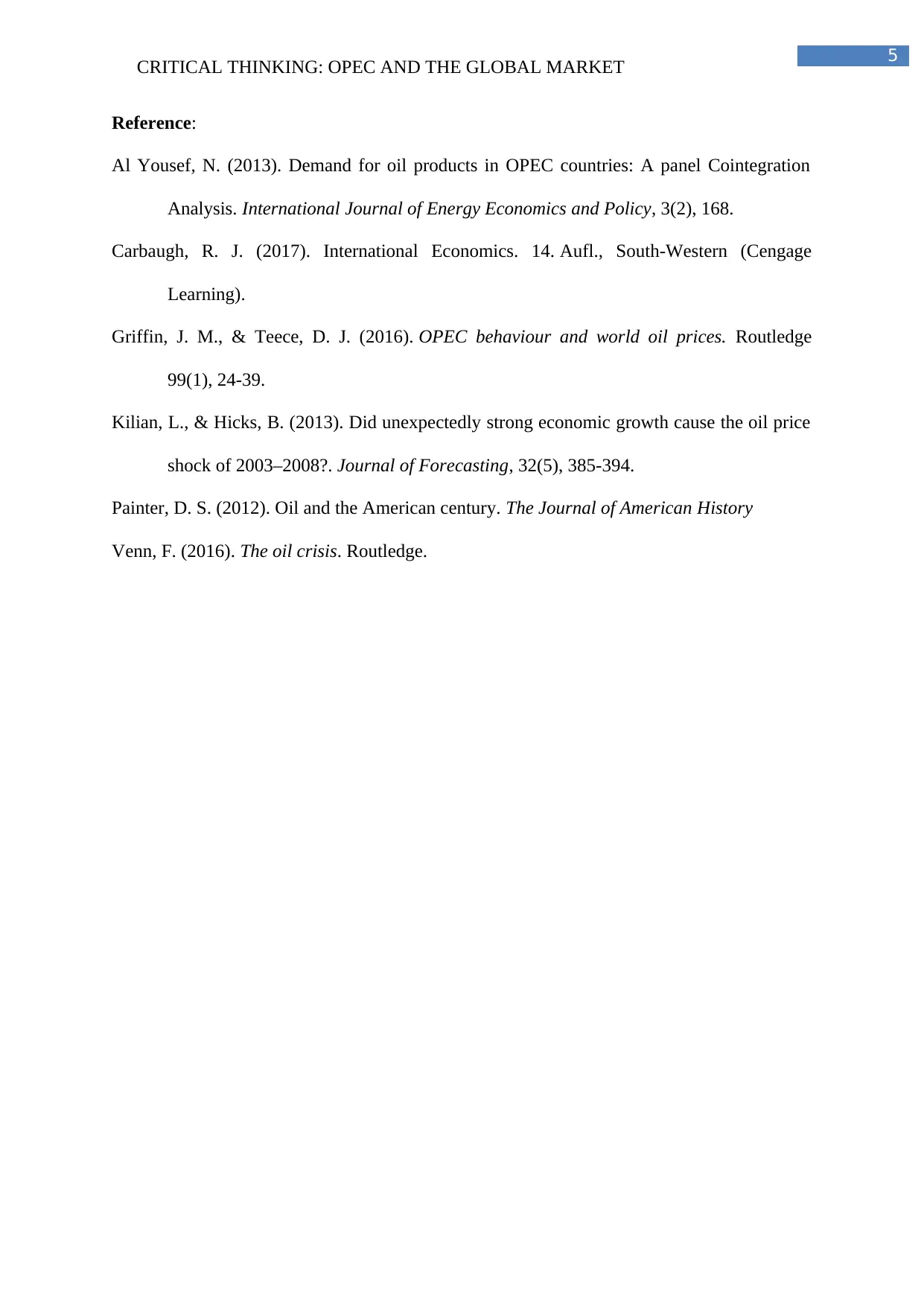
5
CRITICAL THINKING: OPEC AND THE GLOBAL MARKET
Reference:
Al Yousef, N. (2013). Demand for oil products in OPEC countries: A panel Cointegration
Analysis. International Journal of Energy Economics and Policy, 3(2), 168.
Carbaugh, R. J. (2017). International Economics. 14. Aufl., South-Western (Cengage
Learning).
Griffin, J. M., & Teece, D. J. (2016). OPEC behaviour and world oil prices. Routledge
99(1), 24-39.
Kilian, L., & Hicks, B. (2013). Did unexpectedly strong economic growth cause the oil price
shock of 2003–2008?. Journal of Forecasting, 32(5), 385-394.
Painter, D. S. (2012). Oil and the American century. The Journal of American History
Venn, F. (2016). The oil crisis. Routledge.
CRITICAL THINKING: OPEC AND THE GLOBAL MARKET
Reference:
Al Yousef, N. (2013). Demand for oil products in OPEC countries: A panel Cointegration
Analysis. International Journal of Energy Economics and Policy, 3(2), 168.
Carbaugh, R. J. (2017). International Economics. 14. Aufl., South-Western (Cengage
Learning).
Griffin, J. M., & Teece, D. J. (2016). OPEC behaviour and world oil prices. Routledge
99(1), 24-39.
Kilian, L., & Hicks, B. (2013). Did unexpectedly strong economic growth cause the oil price
shock of 2003–2008?. Journal of Forecasting, 32(5), 385-394.
Painter, D. S. (2012). Oil and the American century. The Journal of American History
Venn, F. (2016). The oil crisis. Routledge.
⊘ This is a preview!⊘
Do you want full access?
Subscribe today to unlock all pages.

Trusted by 1+ million students worldwide
1 out of 6
Related Documents
Your All-in-One AI-Powered Toolkit for Academic Success.
+13062052269
info@desklib.com
Available 24*7 on WhatsApp / Email
![[object Object]](/_next/static/media/star-bottom.7253800d.svg)
Unlock your academic potential
Copyright © 2020–2026 A2Z Services. All Rights Reserved. Developed and managed by ZUCOL.





